On December 4, over 30 of Taipei's film delegates led by Lin Teng-fei, president of the China Film Company, left for Bangkok. They took with them five well selected films, all of which had won previous affirmation at Taiwan's own Golden Horse Awards in November. The films included: "Teenage Fugitive", "Old Mo's Second Spring", "Jade Love", "All the Youthful Days" and "Ah-Fei".
While in past years, Chinese films selected for the festival relied upon the actors and cast for distinction, the excellence of this year's films was due to the collective strength of directors and producers as well. This time the group that went to Bangkok was comprised of both beauty and talent.
The December film festival happened to occur during the birthday of the King of Thailand, as well as Thailand's National Day. As part of the yearly celebrations, as many as 120 open-air movies are shown in Bangkok's central square. Taiwan's delegates arrived just in time to enjoy the festivities. Although it was difficult for anyone in the vast sea of onlookers to see any film from start to finish, it was a thrill to witness the charm and attraction that good movies have always held.
In the past, Chinese films have found a large market in southeast Asia. In recent years however, the market has stagnated, being limited to a small number of kung-fu movies with poor box office receipts. The stagnation was due to the industry's failure to come up with new breakthroughs in film content and quality.
Last year marked a turnaround for Chinese film-makers. Past failures triggered a new self-assessment, which resulted in an unprecedented revival of both the industry and the Asian viewing audience.
As confirmation of this trend, Chinese film delegates arriving in Bangkok were delighted to discover that Chinese movies, some dubbed in Thai, are now being shown to full houses. Most popular among these is "Papa, Can You Hear Me Sing?", in which Sun Yue plays a deaf foster father. As tapes of the movie's sound track are sold everywhere in Bangkok, Thai critics describe it as the most exceptional literary film shown in Thailand in the past ten years.
Participants in the 29th Asia Pacific Film Festival included Taipei, Hong Kong, Jakarta, Kuala Lumper, Singapore, Tokyo, Seoul, New Zealand and Bangkok. Thirty-one dramatic films and six documentaries contested for 13 different awards. The festival planning committee invited a group of movie directors, playwrights, film critics, scholars and journalists to act as judges.
The actual awards ceremony was accompanied by a number of preliminary activities. Movies from each country were shown simultaneously in four projection rooms, allowing delegates to see those foreign films which they may have little opportunity to view at home. Consecutively viewing a number of films provided an educational opportunity for delegates to discuss and compare methods, and to further expand their fields of vision.
Other activities included seeing the sights in Bangkok and a visit to the ancient city of Ch'ing Mai, where delegates were warmly welcomed by traditional Thai dancers. During a visit to the King's Summer Palace, the guests were treated to exotic entertainment and a lavish Thai banquet.
The awards ceremony took place at the Thai National Museum on the evening of the eighth. The first announcement was a good omen for the Chinese delegates as Lin Hsiu-ling, the female lead in "All the Youthful Days" won the special mass broadcasting award, conferred by local journalists to the year's most popular and photogenic star.
The Chinese continued in a series of successes. The award for best female actress went to Yang Hui-shan for her role in "Jade Love", where she played a traditional Chinese woman overcome by strong passions. Yang Hui-shan, an actress for ten years, was initially more renowned for her beauty than for her acting abilities. Determined to become an actress rather than a star, she sought professional training and became more selective in her choice of roles. Her efforts received immediate confirmation.
"Teenage Fugitive", a moving film about a strong-willed working mother who defends her children from a menacing killer, took four awards. Chang Hung-yi received an award for the music in "Jade Love". By the end of the ceremonies, in addition to the mass broadcasting award, the Chinese had won the awards for best cinematography, sound effects, music, female actress, and a special award for best child actor--a total of seven in all. While Taiwan won the most awards, Japan was second with six.
In the years from 1958 to 1972, Taiwan won 59 awards at the Asia Pacific Film Festival. Because judges and judging standards vary from year to year, in order to prevent offending the contestants, the festival became non-competitive in 1973. As all participants won awards, the awards lost their authoritativeness. Three years ago, the festival began once again to offer awards according to merit, and the activity has since revived its former authority.
Careful planning, fairness and friendly hospitality made the 29th Annual Asia Pacific Film Festival in Bangkok a complete success. As it recognized and encouraged recent breakthroughs in Chinese film, the festival was a particularly high point for Taiwan's film industry.
This recognition also offered the Taiwan film industry increasing opportunities to develop a foreign market for both film and video. After the festival, contracts were made with film representatives from Malaysia, Bangkok and Singapore for expanding Chinese movie showings in these markets. In the past, movie profits were low and investors difficult to find. Now, growing markets portend an increase in investment, and greater opportunities for the development of talent in the industry.
Taiwan's success in Bangkok is only a beginning. The next Asia Pacific Film Festival will be held in Tokyo. Chinese film-makers are making a complete effort to bring the quality and originality of Chinese film to even higher levels. Next year in Tokyo they just may break their own record.
(Jill Ardourel)
[Picture Caption]
1. The golden phoenix, awarded at the 29th Annual Asia Pacific Film Festival. 2. Ch'i La-wen (left) delivers an opening speech at the awards ceremony. 3. The Asia Pacific Film Festival formally began with the lighting of a huge candle by a representative of the Thai Department of State.
1. The Tokyo delegation won six awards, second only to the Taipei delegation. 2. Actress Yang Hui-shan (right) won the award for best actress for her role in "Jade Love". 3. Dancers from Ch'ing Mai dance in the letter formation "WELCOME" to greet the delegations from each different country at the airport.
1. The opening ceremony for the film festival took place at the Thai National Museum.
2. A young Thai woman performs a traditional dance at one of the festival's evening activities.

2. Ch'i La-wen (left) delivers an opening speech at the awards ceremony.

3. The Asia Pacific Film Festival formally began with the lighting of a huge candle by a representative of the Thai Department of State.

1. The Tokyo delegation won six awards, second only to the Taipei delegation.

2. Actress Yang Hui-shan (right) won the award for best actress for her role in "Jade Love".

3. Dancers from Ch'ing Mai dance in the letter formation "WELCOME" to greet the delegations from each different country at the airport.

1. The opening ceremony for the film festival took place at the Thai National Museum.

2. A young Thai woman performs a traditional dance at one of the festival's evening activities.